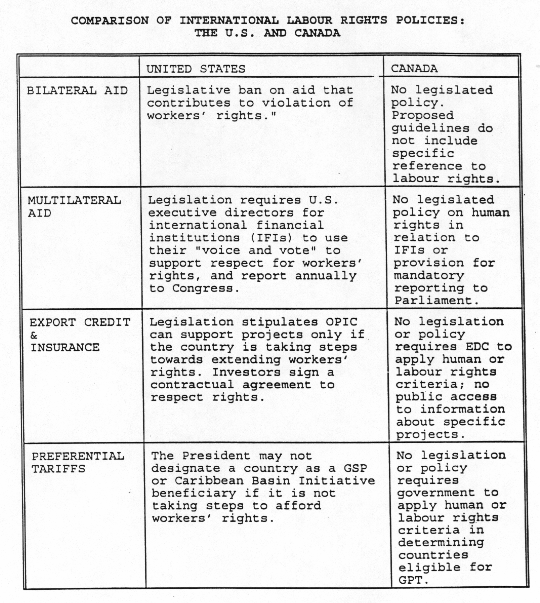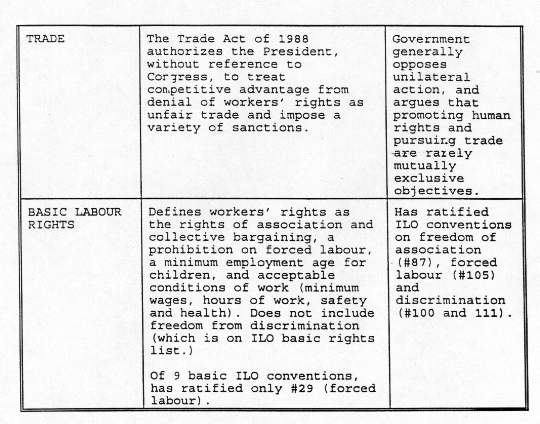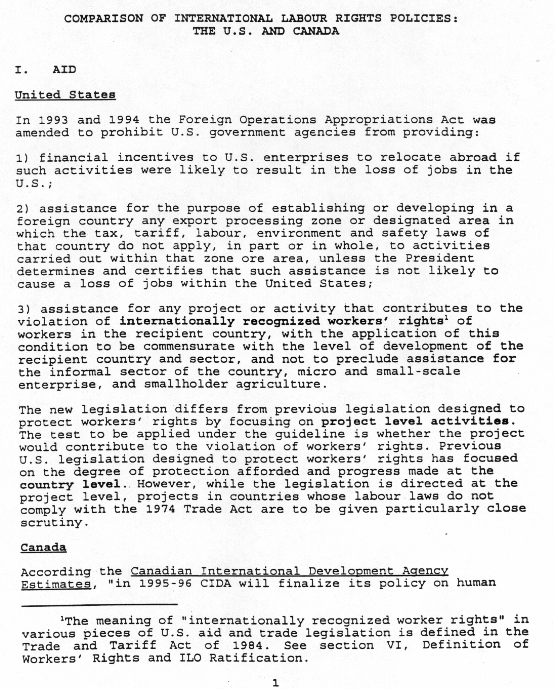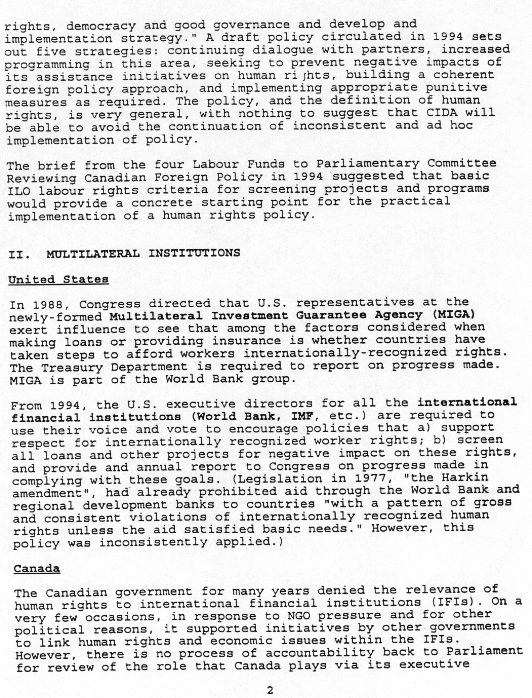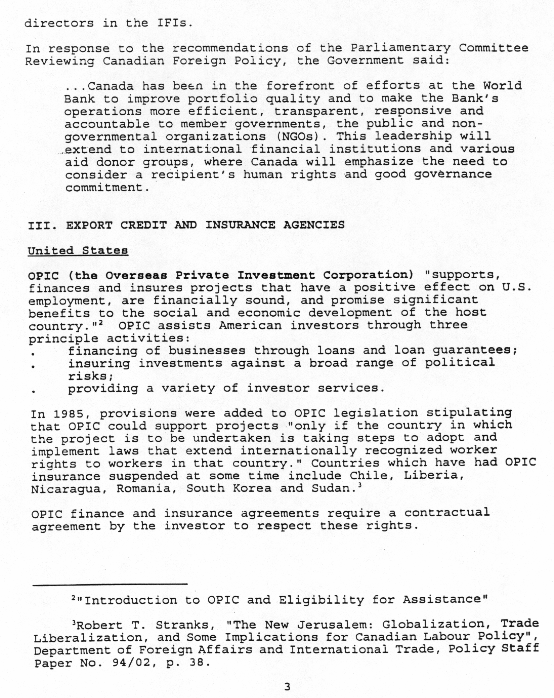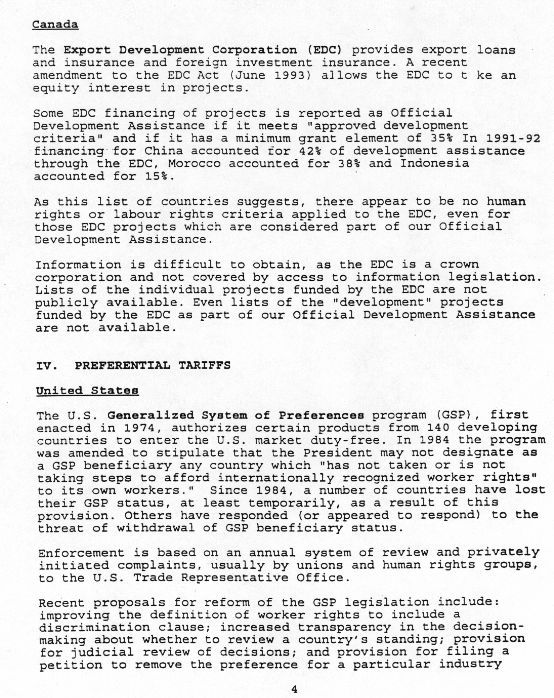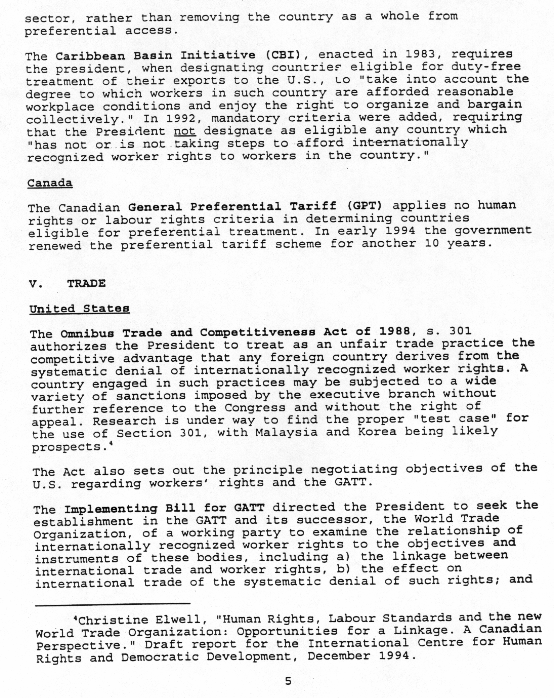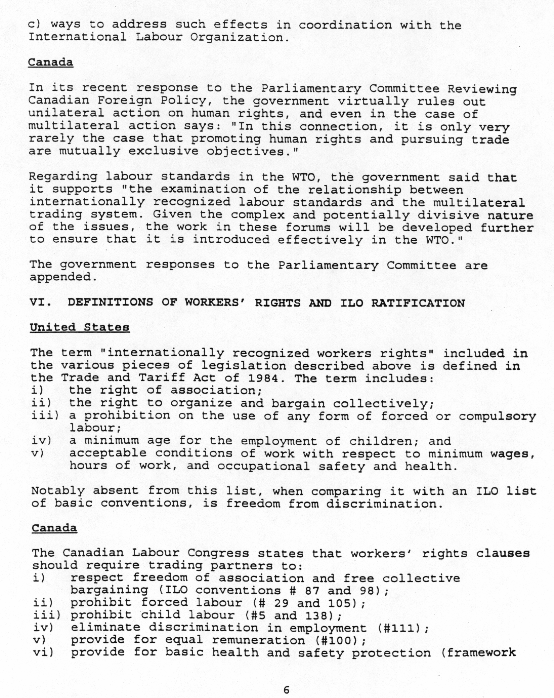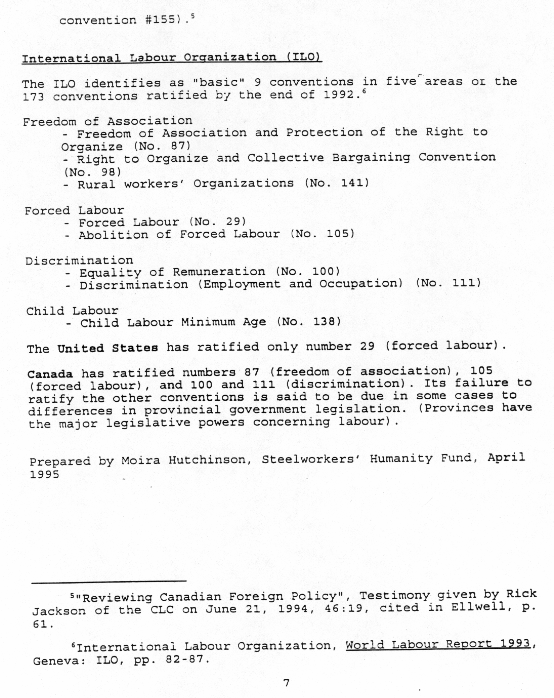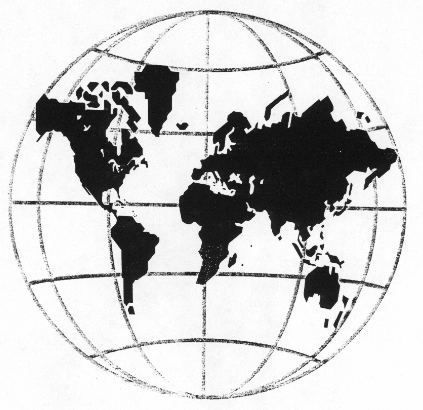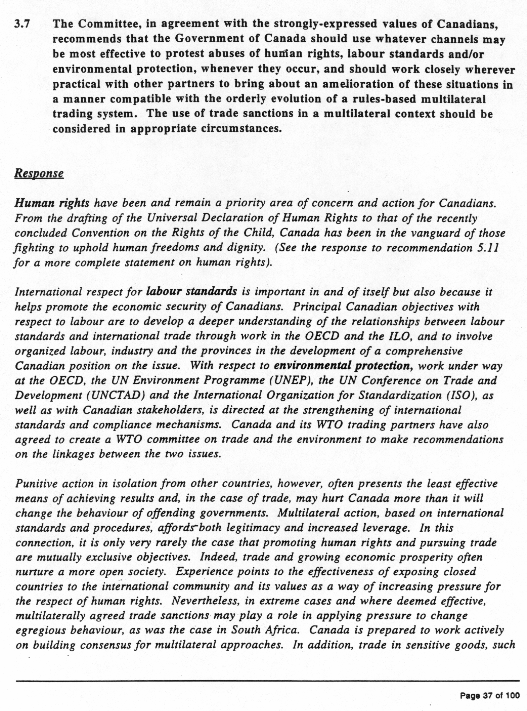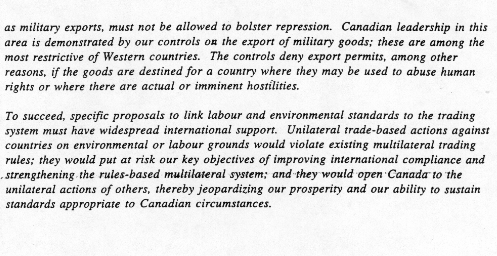|
BP-416E HUMAN RIGHTS, GLOBAL
MARKETS:
Prepared by: TABLE
OF CONTENTS BETWEEN MINIMALIST AND MAXIMALIST APPROACHES MEASURES
INITIATED UNILATERALLY BY THE PRIVATE A. Private Sector Responses and Codes of Conduct B.
Public Sector Responses and Legislative Actions A. Arguments Against International Labour Standards B. Arguments For International Labour Standards D. International Trade Organizations: A "Social Clause" in the ILO and WTO?
HUMAN RIGHTS, GLOBAL MARKETS:
The newly-appointed Minister for Foreign Affairs, Lloyd Axworthy, reiterated in a 13 February 1996 speech that "respect for human rights is a critical component of the Canadian identity and therefore must play an important role in our foreign policy agenda."(1) He also stated that "both trade and the promotion of human rights can serve the same purpose -- namely bettering the well-being of individuals. ... The key is to find the right balance between our human rights and commercial agendas and then build a strong consensus behind it."(2) In highlighting the main points brought before the Subcommittee on Human Rights from September to December 1995, the staff summary paper distributed to Committee members in March 1996 observed that:
The main purpose of this paper is to deal with these important issues and identify initiatives that could be undertaken by Canada -- unilaterally, bilaterally, and/or multilaterally -- to make trade policies consistent with realizing human rights objectives. BETWEEN MINIMALIST AND MAXIMALIST APPROACHES The evolving debate over linkages between trade, global markets and human rights is characterized by concurrent areas of consensus and discord. The briefing note prepared for a recent conference in Toronto entitled "Globalization, Trade and Human Rights: The Canadian Business Perspective" aptly summarized the situation as follows: "While most agree globalization has the potential to promote democracy and human rights, there is no consensus concerning the circumstances under which this is likely."(3) Indeed, it is how the globalization process is "managed" that will determine its effect on human rights; moreover, how to convert any such positive potential into reality is a complex and controversial dilemma.(4) Prescriptions for how best to achieve the objective of protecting and promoting international human rights range from minimalist approaches, whereby market activities remain basically free from governmental attempts to apply normative standards to behaviour within the global economy, to maximalist approaches which seek to elaborate and enforce a rigorous, formalized set of obligations with respect to economic interactions from the local to the global level. On the side of minimal or no intervention in the globalization process, a recent World Bank report rejected any linkage between international trade and compliance with labour rights, working conditions or other human rights criteria. It "call[ed] on governments to pursue ‘market-driven’ policies" even going so far as to suggest "curtailing trade union rights and privileges."(5) As well, some supporters of unrestricted trade liberalization claim that positive results from the process will tend to far outweigh any negative effects. In this worldview, economic liberalization provides the path to political liberalization by producing increased capital and technology for the development of democratic institutions and infrastructure.(6) One element of the private sector in particular, led principally by large transnational corporations (TNCs), maintains that globalization positively impacts on human rights. For example, Thomas d’Aquino, President and Chief Executive, Business Council on National Issues, argues that trade reinforces good governance and democratic ideals by promoting openness, transparency and accountability through liberal economic policies and by encouraging economic growth which raises standards of living.(7) While he does not claim that globalized free trade is a panacea for the world's human rights problems, d’Aquino emphasizes that "benefits are flowing overall from the greatly expanded reach of trade, investment, capital and technology -- benefits that have led to an important enhancement on a global basis of social progress, democratic development and human rights."(8) Furthermore, trade relationships with other countries bring opportunities to comment on political issues through what has been referred to as "constructive engagement." Even when recognizing the potential negative effects of economic liberalization ("unemployment, social dislocation, income disparities..."), d’Aquino stresses that attempts to "roll back or constrain the forces of trade, investment capital or technology" are not the way to address the problem effectively.(9) However, d’Aquino concedes that individual governments and multilateral organizations, including the World Trade Organization, will be integral to finding a solution to the trade-versus-human-rights dilemma, stressing all the while that "business has a very important role to play" in developing consensus on all levels.(10) At the other end of the spectrum, the most ardent advocates of a maximalist approach propose the adoption of detailed and enforceable measures in order to regulate, formally and to the widest extent possible, international trade and labour standards. According to Christine Elwell, there must be a global effort to establish "cross-institutional initiatives" which would incorporate human rights criteria and labour standards into all international trade agreements, thereby creating a complex system to regulate the global market.(11) The argument against unrestricted trade liberalization highlights that "inadequate attention is being paid to the needs of working people in th[e] process" of a "race to the bottom" where "labour standards are lowered in order to attract investment."(12) In his speech to the aforementioned 1996 conference, human rights activist Han Dongfang described the reality of globalization as it affects human rights in China. According to Dongfang, while
Despite the positive pressures that the introduction of market economies might exert, one can conclude that openness to global markets is not a sufficient condition for, nor does it necessarily favour, the protection and promotion of basic human rights. Trade policy expert Ann Weston of the North-South Institute observes that "it is wrong to assume that trade will necessarily work to improve labour standards, either in the South or the North."(14) For that reason, some argue, such issues can only be dealt with through institutionalized responses. The realities of the current global marketplace and the impact of international competitive pressures on the policies of nation-states are troubling to many human rights advocates. For example, Ed Broadbent, President of the International Centre for Human Rights and Democratic Development (ICHRDD), has spoken of a growing perception that "democratic governments [including the Government of Canada] have become more preoccupied with conquering new markets than they have with defending human rights."(15) At the same time, if lower profile, there has been considerable positive government and NGO attention to supporting human rights through institution-building, and technical and financial assistance. Recently, the debate has also been over whether trade sanctions or restrictions are the best way of improving labour standards.(16) These issues, as well as the quest to balance policy consistency with the need for flexible strategies appropriate to address each specific circumstance, are likely to continue to dominate the discussion of human rights and trade policy linkages. The central question that arises is: what should be the next steps forward in foreign policy in order to bring about a progressive realization of both trade and human rights objectives? To help to address that question, the following sections will:
MEASURES
INITIATED UNILATERALLY BY THE A. Private Sector Responses and Codes of Conduct In a recent speech to both business and non-governmental organizations, Ed Broadbent outlined various strategies that companies could adopt to promote respect for human rights. Among those he suggested were: adopting independently monitored codes of conduct; integrating human rights into firms’ business strategies through the development of issue-awareness and through explicit linkage of corporate activities to respect for basic rights in the countries where the company does business; contributing privately earned moneys to the work of organizations that promote human rights; and encouraging "better international trade agreements" through the incorporation of human rights criteria into NAFTA, APEC and the WTO.(17) Each of these suggestions -- most particularly the first and last -- entails that corporations be willing to subject their activities to outside scrutiny, something that they have usually carefully guarded against. This section will concentrate on the first suggestion and the issue of independent codes versus corporate self-regulation.(18) The first codes of conduct, which appeared in the early 1970s, were largely a result of pre-emptive action by corporate entities "in an attempt to head off what they saw as more dangerous and potentially compulsory government codes."(19) Such voluntary codes publicly outline practices that a given corporation considers acceptable (or unacceptable) and address the consequences for its trading partners should they fail to meet the standards established by that code. Standards can vary depending on the needs and limitations of the corporation and codes are typically "self-certified."(20) Arguing that many aspects of codes of conduct are problematic, John Cavanagh of the Institute for Policy Studies observes that, while "many of the principles [contained in such documents] are laudatory ... [there are no provisions for] any enforcement mechanisms or independent audits."(21) This leaves the impression that such actions are a public-relations ploy.(22) Cavanagh further notes that the effectiveness of codes can be undermined by complex chains of subcontracting which allow firms to deny responsibility for practices beyond their control. In addition, most codes lack "uniform language" and are "unclear" or "inadequate" in establishing concrete guidelines for the implementation of standards.(23) To address these deficiencies, corporations could make provisions for greater transparency. One such remedy would allow for public and independent assessment of corporate practices by citizens’ groups such as the Canadian Taskforce on the Churches and Corporate Responsibility (or by government, see below).(24) Independent monitoring, however, has been largely rejected by the corporate community. This lack of "corporate accountability" may change through sustained consumer pressure; citizen movements have, in fact, been instrumental in pushing corporations to create codes and strengthen accountability to the public. An "alternative trade movement"(25) has also pursued consumer education through "fair trade mark" campaigns(26) and has been relatively successful in exerting pressure on the private sector through boycotts; for example, the boycott of Nestlé products in reaction to the marketing of infant formula in developing countries resulted in changes in the company’s practices.(27) However, such tactics are no guarantee against abuses or, worse, could even backfire.(28) For example, UNICEF has critiqued current campaigns to eliminate child labour (such as that begun by the remarkable Canadian teenager Craig Kielburger, or the "rugmark campaign") on the grounds that these well-intentioned efforts may perversely end up by impacting negatively on children and their families through displacing those who may have no alternative source of income and no access to education.(29) It has been suggested that one way of compensating for the inadequacies of voluntary or self-appointed corporate codes of conduct would be to involve governments and legislatures directly in deliberating about the problems. B. Public Sector Responses and Legislative Actions Government involvement in the development and regulation of codes of conduct could serve two main purposes. First, "governments could establish official guidelines for good corporate behaviour that would be applicable to the international activities of their corporations."(30) This would lend a sense of direction and consistency to the practice by providing corporations with a set of goals that the government recommended be adopted (but did not itself enforce). Second, to address the inadequacies of the voluntary nature of most codes, the government could enact legislation to make the regulation of corporate practices compulsory.(31) By no means limited to involvement in codes of conduct, unilateral action in the public sector could also entail initiatives to adopt legislation formalizing the link between human rights and trade in all areas of government policy. As with compulsory codes, such attempts at legislation can be both controversial and problematic. 1. Government Guidelines for Corporate Codes of Conduct In late 1994, the Clinton Administration in the United States adopted a document outlining "Model Business Practices."(32) It provides U.S. companies with a point of reference "in framing their own [completely voluntary] codes of conduct" and is "not intended for legislation."(33) The five principles contained in the document were developed through extensive consultations between the government, business and labour leaders, and non-governmental organizations. They include:
The United States government has also committed itself to the development of a "library" of codes of conduct for consultation by interested parties, including corporations seeking guidance on developing their own code. The administration is seeking international support for the initiative and has encouraged other governments to adopt similar guidelines which, through recognition of leadership, would provide incentives to corporations to comply with minimum standards.(35) If the Canadian government chose such an approach, it would, like the American administration, face significant hurdles. First, principles would have to be stated clearly and precisely so as to reduce the ability of corporations to interpret standards with excessive latitude. Second, and more importantly, the mere existence of guidelines and voluntary codes would in no way ensure effective compliance. Corporations would remain free to ignore government exhortations. That said, it is important not to dismiss too quickly the potential benefits of government guidelines. Combined with consumer pressure on corporations to comply, guidelines might very well provide an essential foundation for linking human rights and labour standards with trade in global markets. However, some additional legislation would still likely be required to bring all aspects of Canadian policy in line with the objective of preserving and promoting international human rights. 2. Unilateral Government Legislation Compared to the United States, Canada lacks legislated policies in a number of areas considered crucial to the promotion of international labour rights, including bilateral aid, multilateral aid, export credit and insurance, and preferential tariffs.(36) There is no specific legislated framework for bilateral aid. With regard to multilateral aid, Canada does not include human rights in its legislation on international financial institutions, nor, therefore, does it require mandatory reports to Parliament on any measures of compliance with Canadian values. Canada's Export Development Corporation (EDC) is not required to apply human rights criteria when evaluating applications for export credits and insurance. Furthermore, there is "no public access to information about specific projects" undertaken by the EDC.(37) This undermines the transparency of the process. Lastly, the Canadian "General Preferential Tariff" (GPT) program does not require the application of human rights criteria to determine a country’s eligibility for preferential treatment.(38) In contrast, the United States government uses a number of "legislatively-mandated measures designed to protect the labour rights of workers in foreign countries" including incorporating workers rights criteria into:
Philip Alston, however, suggests that these unilateral U.S. actions are founded primarily on rhetoric rather than "the substance of ‘international standards’" as outlined in instruments which the US itself has failed to ratify. (Indeed, one area where Canada has surpassed the United States is in ratification of the International Labour Organization’s (ILO) conventions on basic labour rights and of the United Nations’ International Covenant on Economic, Social and Cultural Rights.(40) Alston further questions how the United States, which has refused continuously "to submit itself to multilateral accountability," can apply to other states standards which it has not formally accepted.(41) Such an approach ignores existing international mechanisms and even undermines international standards by contradicting them. In Canada, as in the United States, resistance to unilateral legislation restricting trade on the basis of labour standards and human rights performance is concerned primarily with the fact that these actions --
Combined with the fact that these measures often have little impact, it seems that they may end up being "more symbolic than anything else."(43) However, if unilateral legislation becomes an option, the Canadian government could learn from the flawed American experience. For example, a revised GPT program would have to address dilemmas over which standards to use, what the process should be for judging whether they are being respected, and how to determine the effect (if any) this will have on targeted countries. Some of the reforms suggested by Alston for the United States would be applicable to Canada in such a scenario. He sees "normative consistency" and the establishment of "reasonably clear criteria" in developing mechanisms which "follow fair and consistent procedures, and [aim to avoid] double standards as far as possible" as crucial to developing an effective link between international human rights standards and trade practices.(44) Governments that would judge others should first themselves ratify the relevant international agreements on basic human rights, including ILO conventions. That in turn would improve the ability of states to ensure a more overall consistent use of ILO-generated information according to reasonably objective standards. Combined with additional steps, such as the inclusion of human rights experts in government departments responsible for developing legislation, and the implementation of "procedural safeguards" to promote "fairness, impartiality, objectivity, and transparency in the process of assessing a government’s compliance with accepted standards," such actions would help to counter accusations that, by introducing unilateral legislation, governments, mostly from the rich North, are really just indulging in disguised forms of protectionism.(45) In other words, unilateral measures can be reformed and made more acceptable by being aligned with multilateral standards and actions, the object of both being to improve the effectiveness and legitimacy of policies linking human rights to trade and investment under conditions of open global markets. Advocates of a maximalist approach have called for governments to implement binding codes, not only at the national level but also at the international level. For example, Elwell argues that: "A code of conduct for multinational enterprises integrated in a multilateral agreement would formally oblige all member states to require that multinationals respect the established principles of the host country."(46) While documents such as the 1977 ILO "Tripartite Declaration of Principles concerning Multinational Enterprises and Social Policy" offer "guidelines to governments, firms, and workers in the areas of industrial relations, employment, training, and working conditions,"(47) as yet no international organization has developed enforcement mechanisms, a subject which remains highly controversial. Several past attempts in this direction -- e.g., the 1975 United Nations Commission on Transnational Corporations -- have failed in part due to pressures from individual state governments.(48) A. Arguments Against International Labour Standards Those who oppose formal international standards -- primarily multinational companies and investors -- argue that market mechanisms are the most effective way to regulate international trade. Any attempt to develop multilateral agreements on labour standards would be incompatible with a free global market, as it would "fix" standards between countries, resulting in a form of "cost equalization."(49) These reservations about international standards are not limited to the private sector. Certain industrialized countries fear that "the costs of pressing for new links between trade and basic human rights outweigh the likely benefits."(50) As for developing countries, some fear "competition and loss of capital," inability to comply with or implement standards, loss of "comparative advantage"(51) and "protectionism by the north to prevent the development of the south."(52) Of these, the principal concern is protectionism -- the use of tariffs and non-tariff barriers, such as linkage to minimum standards, to insulate a home market that might otherwise be vulnerable to imports. If international standards were formalized, regulated and enforced, certain countries could use them for protectionist ends, depriving less-developed countries of the benefits of their comparative advantage -- namely, low wage costs. As expressed by Erika de Wet, the concern is that the "social clause [would] force developing countries to raise their labour costs artificially,"(53) negatively affecting their growth prospects and the world economy overall. B. Arguments For International Labour Standards While most arguments for international labour standards are typically normative, citing the need "to end abuse and exploitation of workers"(54) as their driving force, there are also non-normative arguments. For example, the development of a "social clause" in international trade agreements could restrict "social dumping," a term referring to
The international community ought therefore to address labour rights issues through formalized regulations since, to cite de Wet, "optimal social protection requires political negotiation and standard-setting and cannot be left entirely to market forces [...as market forces put] countries under pressure to lower their labour standards, which could lead to ‘social dumping’."(56) Proponents of such internationally applied labour standards dispute, furthermore, their critics’ contention that a social clause is intended to achieve "cost equalization" or "standardized costs." Claims that a social clause would seek to eliminate the competitive labour-cost advantages of less-developed countries are unfounded. For example, on the issue of a minimum wage, a social clause would seek to establish a "universal principle of a minimum wage" rather than a "uniform minimum wage" for the entire globe.(57) This would allow each country to establish its own legitimate levels, based on available resources and the basic requirements of its population for a minimum standard of living particular to that country. In the words of Ray Marshall, "while having low wages because of underdevelopment is legitimate, strategies to gain competitive advantage by suppressing wages and labour standards are not."(58) As a result, a social clause would be designed to address cases where clearly unacceptable labour exploitation and abuses of human rights can be established, without this compromising countries’ pursuit of legitimate trade objectives. Such measures could be undertaken in a variety of forums, including both regional and international organizations. Canada’s involvement in at least two regional organizations -- namely, NAFTA and APEC -- offers an opportunity to pursue social clauses at the regional level as well. There is no formal social clause within the confines of the North American Free Trade Agreement, despite the existence of an attached "side-agreement" on "labour cooperation." Elwell observes that "the present Labour Agreement does not have the machinery needed to enforce international workers’ rights and standards if they have not already been implemented into the NAFTA partner's domestic law."(59) The Canadian government could adopt policies to reinforce and strengthen the NAFTA labour side-agreement by insisting, for example, that "each country [including Canada itself] respects its own labour laws and provides for a variety of remedies in cases where these laws are violated, ranging from consultations between countries to trade sanctions."(60) Increased transparency in regard to implementation of the agreements could also strengthen labour rights in North America.(61) Canada is also a member of APEC (Asia Pacific Economic Cooperation), which is a much looser regional trade-oriented association than NAFTA. The Asian-Pacific region, moreover, is the only one that "does not have its own specific human rights instruments or a regional mechanism for the protection of human rights."(62) As yet, only eight of the eighteen member countries of APEC have ratified the United Nations’ International Covenant on Economic, Social and Cultural Rights (ICESCR). While Canada has long been a signatory to the ICESCR, both China and the United States are among those that are not. Thus, Canada stands in a position to provide encouragement and leadership to APEC to adopt measures which would preserve and promote respect for international human rights, including labour standards. D. International Trade Organizations: A "Social Clause" in the ILO and WTO? Past attempts to include a "social clause" -- which would define "the violation of workers' basic rights as unfair trade practices punishable by trade sanctions" -- in international trade organizations have repeatedly been defeated.(63) Principal reservations with respect to such measures include concerns that a social clause would be abused by protectionist forces and, as discussed earlier, would have an unfair, asymmetrical impact on less-developed countries. Many experts have nevertheless come to recognize that international labour standards cannot be dealt with exclusively as a human rights issue in the abstract; they are intimately connected with the issues of production for export and the rules under which trade is conducted across borders. Thus, "both international bodies and specialized agencies [i.e., the International Labour Organization (ILO) and the General Agreement on Tariffs and Trade (GATT), now the World Trade Organization (WTO)] have a role to play and should cooperate in this regard."(64) Since 1919, the "main mission" of the International Labour Organization (ILO) -- of which Canada is a founding member -- has been to preserve, promote and monitor international social and economic rights.(65) As with most international organizations, the basic rights contained in ILO conventions are binding only on states that have ratified those conventions, with one exception: the convention on "freedom of association ... is binding for all member states of the ILO."(66) With no consensus on which standards should be included, there has long been some resistance to writing a social clause into the ILO.(67) To counter this, advocates of the clause have developed two arguments. First, they maintain that efforts to develop a clause should concentrate on those labour standards that are already widely accepted.(68) Furthermore, according to de Wet, "it is not so much the number of standards that are important, but the type"; thus, a social clause would include basic rights -- freedom of association, collective bargaining, prevention of forced labour, and prohibition of discrimination -- as outlined by ILO conventions which have been ratified by a high percentage of countries in proportion to the total membership.(69) As other conventions -- on the introduction of a minimum age, provisions for occupational safety and health, and the setting of minimum wage levels, among others -- enjoy increased ratification, the scope of this clause could be expanded.(70) The argument in support of a social clause asserts that "universality does not always depend on this ratification of specific conventions [since] these standards are also protected in other widely ratified international instruments" -- most notably the International Covenant on Economic, Social and Cultural Rights, which goes even further. Many countries have therefore already "willingly committed themselves to protect their workers on a much wider scale than what is actually foreseen by a possible social clause."(71) Yet, it must also be acknowledged, the simple inclusion of a social clause under the ILO might well prove inadequate to respond effectively to abuses of workers' rights. And, given that "the ILO’s supervisory mechanism is based on persuasion and voluntary compliance with freely accepted international obligations,"(72) any social clause would be difficult to enforce. To address such weaknesses, some experts have suggested that efforts in the ILO should be coupled with revisions to the GATT/WTO. According to Elwell, "the new World Trade Organization offers greater opportunities than ever before to link human rights and labour standards" as it has the authority to respond to accusations of unfair trade practices and administer sanctions.(73) As Cavanagh points out, it is for this reason that "trade unions favour a mechanism whereby it is still the ILO that determines workers’ rights conventions and the ILO would handle petitions on violations, yet it would be the trade agreements that have the enforcement powers of sanctions or fines."(74) Under such a system, the ILO tripartite committee could review the practices of individual governments with respect to labour rights and make recommendations for improvements that would have to be implemented within a given time-frame. If a "government failed to make adequate efforts ... [other] governments could turn to the GATT/WTO to enact the second stage of the implementation system."(75) The WTO would then determine the appropriate response and act accordingly. To establish such a system would require certain modifications to the GATT -- the foundation of the WTO -- to establish links between WTO membership and respect for the obligations created by specific ILO conventions.(76) In order to facilitate the above process and achieve policy coherence between the two organizations, "the implementation of a social clause would also imply cooperation [and coordination] between the ILO and the GATT/WTO."(77) This would take place in two stages. First, countries would have to respect the "internationally recognized workers' rights," which, in accordance with ILO procedures and the standards in the social clause, would rely principally on moral suasion.(78) Second, failure to fulfil these obligations would prompt action by the WTO, ranging from the denial of membership and trade sanctions to "constructive assistance."(79) As de Wet observes, however, if such a system is to be created, it will require a clear understanding by all parties "of the [current and potential] relationship between the GATT and the ILO."(80) Furthermore, "...such a system could only function if the membership of the GATT/WTO and the ILO continue to be almost identical, as is presently the case."(81) These issues would have to be considered carefully before a social clause could be put into practice. To consider implementation of a social clause in international trade organizations raises issues regarding enforcement procedures, since, without enforcement, a social clause would be nothing more than symbolic words without any impact on the real lives of workers around the globe. According to Elwell, this would first and foremost require that "the enforcement of minimum international labour standards ... be based on reciprocity."(82) All countries, regardless of their economic situation or power, would be subject to the same standards, and would therefore have to ensure that they complied "in both domestic and foreign operations."(83) This would ensure greater legitimacy for moral suasion -- "the first step in the enforcement process"(84) -- and avoid protectionist practices and other abuses that might arise. Furthermore, as de Wet observes, "the more effective moral suasion is, the less need there is for sanctions and the negative consequences that result from them."(85) The use of sanctions is a controversial subject and there is consensus that they should preferably be multilaterally applied as a last resort.(86) Due caution is advised since sanctions are a coercive tool whose effects are often negative for both those targeted by them and those applying them. Furthermore, "there is no guarantee that they will succeed."(87) The effectiveness of trade sanctions, embargoes and boycotts is often difficult to ascertain. Elwell points out that they typically do not address "the root of the problem."(88) Others have observed that sanctions "reduce the opportunity for dialogue" by removing or suppressing means for "political leverage" and "constructive engagement" with those abusing rights, and for developing mutual understanding.(89) Nonetheless, sanctions are a way to "demonstrate the international community's disapproval" and may indeed have some influence over time.(90) Cavanagh has made a novel suggestion that could alleviate a number of the negative effects of sanctions. He proposes that "the sanction for violation ... be centered on the violator," e.g., through fines on corporations violating labour rights.(91) By targeting sanctions in this way, the international community and individual countries could avoid unnecessarily harming the innocent people that sanctions are intended to help. Any national government faces pressures from the sometimes conflicting or competing interests of its constituents.(92) When deciding what policies to adopt in order to protect and promote human rights in the fields of labour and trade, the Canadian government must also bear in mind that there are many external as well as domestic actors involved: other governments and parliaments, multinational corporations, industry associations, trade unions, international institutions (ILO, GATT/WTO, the United Nations), numerous NGOs, and groups of consumers and concerned citizens. The government must be attentive to all of these sources of influence as it tries to determine what is in the Canadian public interest. As to whether it is "possible for Canada to pursue its economic interests without compromising its common humanity by overlooking its fundamental values," Professor Errol Mendes suggests a conditional response in the affirmative.(93) According to Mendes, the "trickle down" theory, which purports that the benefits of macro-level economic liberalization will filter down to the general population, is inadequate.(94) Diana Bronson and Stéphanie Rousseau echo this sentiment, stressing that: "growth, in itself, is in no way a guarantee of a greater commitment to fundamental human rights and freedoms. Nor does liberalized trade and investment promise sustainable democratic development at the national, regional or global levels."(95) As for the "trickle up" approach, whereby grassroots organizations and micro-level democracy are encouraged, Mendes argues that this is not enough to secure a government's commitment to preserve and promote international human rights. He observes that: "Civil societies are not created overnight and when they do emerge, they can be quickly suppressed by force...."(96) Therefore, the government would be best advised to pursue a "trickle sideways" approach "which attempts to integrate both governmental and civil society components into a human rights strategy that aims at building and supporting institutional capacity to promote respect for the Rule of Law, good governance and universal human rights."(97) Such an approach promises to be the most sustainable overall. Accordingly, Canada’s human rights strategy internationally could give consideration to the following elements: promoting adherence to the "rule of law" in the context of negotiating international trade rules; supporting effective functioning of organizations such as the WTO, the ILO, and other international and regional trade institutions that would include moving towards multilaterally agreed and enforceable labour rights standards (although resisted by many Asian countries, similar fundamental norms have in fact been accepted in previous UN treaties, e.g., the ICESCR); targeting of bilateral and multilateral aid to support the development of policies, institutions and infrastructures that promote respect for human rights; and in extreme instances, where positive measures are no longer possible, working with others to see that "bilateral and multilateral trade and aid sanctions are ... imposed."(98) Indeed, "a comprehensive approach to promoting human rights internationally cannot be confined solely to any one proposal and will likely incorporate aspects" of the above suggestions(99) as well as establishing means of assessing the impact of these policies through periodic review.(100) In a recent speech to NGOs, the Minister of Foreign Affairs stated that the Canadian strategy would include "support for universal standards of rights and improvement of international rules, covenants and agreements."(101) Canada would achieve this by "taking a leadership role" in developing further multilateral rules which "govern labour standards and human rights," supporting "multilateral forums to implement collective measures," and ratifying conventions.(102) Many of these initiatives mirror those suggested above. Whether through diplomatic and financial encouragement or through the regulation of codes of conduct, unilateral legislation, or bilateral and/or multilateral initiatives to strengthen international standards, the Canadian government does indeed have some serious options available if it is committed to developing more effective policies that will address international human rights and working conditions in the global marketplace. Alston, Philip. "Labor Rights Provisions in US Trade Law: ‘Aggressive Unilateralism’?" Human Rights Quarterly 15, 1993, 1-35. Axworthy, Lloyd. "Notes for Address at the Consultations with Non-Governmental Organizations in Preparation for the 52nd session of the United Nations Commission on Human Rights." Ottawa, 13 February 1996. Broadbent, Edward, President, The International Centre for Human Rights and Democratic Development. "Globalization: The Democratic Challenge." Speech at the Conference "Globalization, Trade and Human Rights: The Canadian Business Perspective." Toronto, 22 February 1996. Bronson, Diana and Stéphanie Rousseau. "Working Paper on Globalization and Workers' Human Rights in the APEC Region." International Centre for Human Rights and Democratic Development, 26 October 1995. Canadian Exporters' Association. "Human Rights." Written Statement to the Subcommittee on Human Rights of the House of Commons Standing Committee on Foreign Affairs and International Trade. November 1995. Cavanagh, John. "Codes of Conduct of Corporations: What Appears to be Working." DRAFT. Institute for Policy Studies and the Transnational Institute, Washington, D.C., September 1995. "Child-Labour Plan Brings Heavy Price." The Globe and Mail (Toronto), 25 March 1996, p. A5. d’Aquino, Thomas, President and Chief Executive, Business Council on National Issues. "Globalization, Social Progress, Democratic Development and Human Rights." Notes for Address to the Conference "Globalization, Trade and Human Rights: the Canadian Business Perspective." Toronto, 22 February 1996. de Wet, Erika. "Labor Standards in the Globalized Economy: The Inclusion of a Social Clause in the General Agreement on Tariff and Trade/World Trade Organization." Human Rights Quarterly 17 (1995), 443-462. Dongfang, Han. Speaking Notes for the Conference "Globalization, Trade and Human Rights: The Canadian Business Perspective Conference." English Translation. Toronto, 22 February 1996. Elwell, Christine. "Human Rights, Labour Standards and the New WTO: Opportunities for a Linkage - a Canadian Perspective." Essays on Human Rights and Democratic Development #4. International Centre for Human Rights and Democratic Development, 1995. Fair Trademark Canada. "Transfair International." (Information Brochure). Government of Canada. Government Response to the Recommendations of the Special Joint Parliamentary Committee Reviewing Canadian Foreign Policy. Ottawa, February 1995. Hutchinson, Moira. "Comparison of International Labour Rights Policies: The U.S. and Canada." Steelworkers' Humanity Fund. April 1995. International Centre for Human Rights and Democratic Development (ICHRDD) and the Business Council on National Issues (BCNI). Briefing Note for the Conference "Globalization, Trade and Human Rights: The Canadian Business Perspective." Toronto, 22 February 1996. Kalmen Kaplansky. "The International Labour Organization." In Human Rights in Canadian Foreign Policy. Robert O. Matthews and Cranford Pratt (eds.). McGill-Queen's University Press, Kingston and Montreal, 1988, p. 115-134. McDonald, Corinne and Gerald J. Schmitz, Research Branch, Political and Social Affairs Division, Library of Parliament. "Main Points from the Testimony Received during the First Phase of Hearings: September - December 1995." Prepared for the Subcommittee on Human Rights of the House of Commons Standing Committee on Foreign Affairs and International Trade. Ottawa, 15 February 1996. Mendes, Errol P. "Trade Linkages to Human Rights, Good Governance and Labour Standards in the Asian Context." Speech to the Asia Pacific Heads of Mission. Vancouver, 13 January 1995. Rossignol, Michel. "Sanctions: The Economic Weapon in the New World Order." Background Paper #346E. Research Branch, Library of Parliament, Ottawa. Revised January 1996. Smith, Gare (Deputy Assistant Secretary for Labor and External Affairs at the U.S. Department of State). "Introduction of the Model Business Principles before the International Labor Organization." 9 November 1995. Thompson, Bob. "Ethical Trading and Sourcing." The Corporate Ethics Monitor, Vol. 7, Issue 6 (November - December 1995). Todd, Dave. "Don't Link Trade and Worker Rights, Report Says." Ottawa Citizen, 27 June 1995. Weston, Ann. The North-South Institute. "Notes for a Speech on Trade, Labour Standards and Human Rights." Given at the Human Rights Network, University of Ottawa, 13 October 1995.
GOVERNMENT RESPONSE TO THE RECOMMENDATIONS OF THE
(1) Hon. Lloyd Axworthy, "Notes for an Address at the Consultations with Non-Governmental Organizations in Preparation for the 52nd session of the United Nations Commission on Human Rights," Ottawa, 13 February 1996, p. 1. (2) Ibid., p. 2. (3) International Centre for Human Rights and Democratic Development (ICHRDD) and the Business Council on National Issues (BCNI), Briefing Note for the Conference "Globalization, Trade and Human Rights: The Canadian Business Perspective," Toronto, 22 February 1996, p. 1, [Toronto Conference]. (4) Ibid., p. 3. (5) Dave Todd, "Don't Link Trade and Worker Rights, Report Says," Ottawa Citizen, 27 June 1995. (6) Briefing Note, Toronto Conference (1996), p. 3. (7) Thomas d'Aquino, "Globalization, Social Progress, Democratic Development and Human Rights," Notes for an Address to the Toronto Conference, 22 February 1996, p. 1-3. (8) Ibid., p. 4. (9) Ibid., p. 6. (10) Ibid. (11) Christine Elwell, Human Rights, Labour Standards and the New WTO: Opportunities for a Linkage - A Canadian Perspective, Essays on Human Rights and Democratic Development #4, International Centre for Human Rights and Democratic Development, Montreal, 1995, p. 3. (12) Briefing Note, Toronto Conference (1996), p. 3. (13) Han Dongfang, Speaking Notes (English Translation), Toronto Conference, 22 February 1996, p. 5. (14) Ann Weston, "Notes for a Speech on Trade, Labour Standards and Human Rights," Meeting of the Network on International Human Rights, University of Ottawa, 13 October 1995, p. 1. (15) Edward Broadbent, "Globalization: The Democratic Challenge," Toronto Conference, 22 February 1996, p. 1. (16) For a succinct review focusing particularly on U.S. manoeuvres, see Oxford Analytica Ltd., "World Row Brews over Push to Link Trade, Labour Rights," The Globe and Mail (Toronto), 18 March 1996, p. B9. (17) Ibid., p. 4-5. (18) The suggestion dealing with international trade agreements is examined in detail below in the section on multilateral initiatives. (19) John Cavanagh, "Codes of Conduct of Corporations: What Appears to be Working," Draft Working Paper, Institute for Policy Studies and the Transnational Institute, Washington, D.C., September 1995, p. 4. (20) Weston (1995), p. 4. (21) Cavanagh (1995), p. 4. (22) According to Bob Thomson, "label monitoring networks, together with their church, union, consumer and business membership bases, provide consumers with independent information and assurances that product claims are not just marketing hype." See his article "Ethical Trading and Sourcing," The Corporate Ethics Monitor, Vol. 7, Issue 6, November - December 1995. (23) Ibid., p. 5-6. (24) Weston (1995), p. 4. (25) Ibid. (26) Programs such as Fair Trademark Canada’s involvement in "Transfair International" work to "establish ... a mark which certifies fairness in trade ... license a label for products which meet international criteria, for sale by Canadian companies ... educate the public, retailers and government about fair trade benefits ... [and] work ... with international movements in research and policy advocacy." See Fair Trademark Canada information brochure. For an additional brief summary of the issue of product labelling, see the Research Branch paper prepared for the Subcommittee on Human Rights by Corinne McDonald and Gerald J. Schmitz, "Main Points from the Testimony Received during the First Phase of Hearings: September - December 1995," 15 February 1996, p. 10. (27) Cavanagh (1995), p. 9. (28) Weston (1995), p. 4. (29) "Child-Labour Plan Brings Heavy Price," The Globe and Mail (Toronto), 25 March 1996, p. A5. For an analysis of some possible constructive alternatives, see John Stackhouse, "New Solutions Fashioned for Child Workers," The Globe and Mail (Toronto), 26 February 1996, p. 1 and A13. (30) Briefing Note, Toronto Conference (1996), p. 5. (31) Weston (1995), p. 4. (32) Gare Smith, Deputy Assistant Secretary for Labor and External Affairs at the U.S. Department of State, "Introduction of the Model Business Principles before the International Labor Organization," Washington, D.C., 9 November 1995. (33) Ibid., p. 2. (34) Ibid. (35) Ibid., p. 4. (36) Moira Hutchinson, "Comparison of International Labour Rights Policies: The U.S. and Canada," Steelworkers' Humanity Fund, April 1995 (see appendix). (37) Ibid., p. 4. (38) Ibid., p. 2-5. (39) Philip Alston, "Labor Rights Provisions in US Trade Law: ‘Aggressive Unilateralism’?" Human Rights Quarterly 15, 1993, p. 1 and 3-4. See also Elwell (1995), p. 8-11. (40) Of nine principal ILO conventions, Canada has ratified four (number 87 on freedom of association, 105 on forced labour, and 100 and 111 on discrimination), whereas the United States has ratified only one. Canada’s failure to ratify the remaining five conventions (two on freedom of association, one on forced labour, and one on minimum age) has been attributed to difficulties in making provincial legislation compatible with international standards; this justification is similar to the American reasoning which highlights incongruities between federal and state powers. See Hutchinson (1995), p. 7, and Elwell (1995), p. 60-61, for lists and examination of these conventions. (41) Alston (1993), p. 32. (42) Government of Canada, Government Response to the Recommendations of the Special Joint Parliamentary Committee Reviewing Canadian Foreign Policy, Ottawa, February 1995, Section 3.7, p. 38. (43) Weston (1995), p. 2. (44) Alston (1993), p. 16 and 22. (45) Ibid., p. 22-23. (46) Elwell (1995), p. 27. (47) Cavanagh (1995), p. 7, and Diana Bronson and Stéphanie Rousseau, "Working Paper on Globalization and Workers' Human Rights in the APEC Region," International Centre for Human Rights and Democratic Development, 26 October 1995, p. 8. (48) Cavanagh (1995), p. 6. (49) Erika de Wet, "Labor Standards in the Globalized Economy: The Inclusion of a Social Clause in the General Agreement on Tariff and Trade/World Trade Organization," Human Rights Quarterly, Vol. 17 (1995), p. 443-462. (50) Elwell (1995), p. 22. (51) In general, the South’s comparative advantage has been dependent on lower wages as a legitimate way to attract foreign investment. (52) Elwell (1995), p. 21. (53) de Wet (1995), p. 449. (54) Elwell (1995), p. 41. (55) Alston (1993), p. 2, note 2. (56) de Wet (1995), p. 447. (57) Ibid., p. 450. See also Elwell (1995), p. 55. (58) As cited in de Wet (1995), p. 451. (59) Elwell (1995), p. 15. (60) Briefing Note, Toronto Conference (1996), p. 4. (61) Weston (1995), p. 3. (62) Bronson and Rousseau (1995), p. 7. (63) Cavanagh (1995), p. 14. See also Elwell (1995), p. 7-8. (64) de Wet (1995), p. 455. (65) Kalmen Kaplansky, "The International Labour Organization," in Robert O. Matthews and Cranford Pratt (eds.), Human Rights in Canadian Foreign Policy, McGill-Queen's University Press, Kingston and Montreal, 1988, p. 115. (66) Bronson and Rousseau (1995), p. 9. (67) de Wet (1995), p. 446. (68) "...Conventions which are well-ratified ... could therefore serve as a minimum core." Ibid., p. 453. (69) Ibid. (70) Ibid. (71) Ibid., p. 454. (72) Ibid., p. 446. (73) Elwell (1995), p. 4. (74) Cavanagh (1995), p. 16. (75) de Wet (1995), p. 459. (76) Ibid., p. 458. (77) Ibid., p. 456. (78) Briefing Note, Toronto Conference (1996), p. 4. See also de Wet (1995), p. 456. (79) Ibid. (80) de Wet (1995), p. 462. (81) Ibid., p. 456. (82) Elwell (1995), p. 33. See also de Wet (1995), p. 458, note 55. (83) Elwell (1995), p. 33. (84) de Wet (1995), p. 456. (85) Ibid., p. 460. (86) For an in-depth look at the use of sanctions by Canada, see Michel Rossignol, "Sanctions: The Economic Weapon in the New World Order," Research Branch, Library of Parliament, Background Paper BP-346E, revised January 1996. (87) Ibid., p. 2. (88) Elwell (1995), p. 35. (89) Canadian Exporters' Association, "Human Rights," November 1995. (90) Rossignol (1996), p. 11. (91) Cavanagh (1995), p. 17. (92) Elwell (1995), p. 22. (93) Errol P. Mendes, "Trade Linkages to Human Rights, Good Governance and Labour Standards in the Asian Context," Speech to the Asia Pacific Heads of Mission, Vancouver, 13 January 1995. (94) "If binding legal obligations under international law to observe universal human rights does [sic] not provide sufficient basis for compliance with these norms, trade and open markets alone will not change the behaviour of some of [Canada's trading] partners." Ibid., p. 3. (95) Bronson and Rousseau (1995), p. 17. A similar argument has been advanced by Weston, p. 6: "Increasing trade on its own is not enough. ... trade policies can play a part -- though in many cases it will be limited." (96) Mendes (1995), p. 3. (97) Ibid., p. 4. (98) Ibid., p. 9. (99) Briefing Note, Toronto Conference (1996), p. 5. (100) Elwell (1995), p. 63. (101) Axworthy (1996), p. 4. (102) Ibid. |
